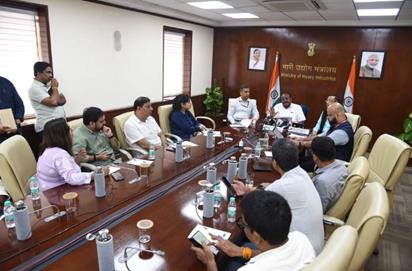India Accelerates Green Mobility with PM-eBus Sewa and E-DRIVE Schemes
In a significant move to bolster electric mobility and green transportation, Union Minister for Heavy Industries & Steel, Shri H.D. Kumaraswamy, unveiled two key initiatives at a press briefing in New Delhi. The “PM-eBus Sewa-Payment Security Mechanism (PSM) Scheme” and the “PM Electric Drive Revolution in Innovative Vehicle Enhancement (PM E-DRIVE) Scheme” were introduced as part of India’s efforts to accelerate the transition to electric vehicles (EVs) and reduce carbon emissions.
Industries & Steel, Shri H.D. Kumaraswamy, unveiled two key initiatives at a press briefing in New Delhi. The “PM-eBus Sewa-Payment Security Mechanism (PSM) Scheme” and the “PM Electric Drive Revolution in Innovative Vehicle Enhancement (PM E-DRIVE) Scheme” were introduced as part of India’s efforts to accelerate the transition to electric vehicles (EVs) and reduce carbon emissions.
PM-eBus Sewa-Payment Security Mechanism (PSM) Scheme
Shri Kumaraswamy highlighted the Union Cabinet’s approval of the PM-eBus Sewa-PSM Scheme, which aims to support the procurement and operation of over 38,000 electric buses (e-buses) across the country. With an outlay of ₹3,435.33 crore, the scheme will provide operational support for e-buses from the financial year 2024-25 to 2028-29, promoting eco-friendly public transportation.
The initiative addresses vital challenges that Public Transport Authorities (PTAs) face, such as the high upfront cost of e-buses and the lower revenue generation compared to diesel or CNG buses. To overcome these barriers, PTAs will engage in Public-Private Partnerships (PPP) under a Gross Cost Contract (GCC) model, where Original Equipment Manufacturers (OEMs) and operators manage e-bus procurement and operations. However, OEMs and operators have expressed concerns over potential payment defaults from PTAs.
The PM-eBus Sewa-PSM Scheme tackles this issue by guaranteeing timely payments to OEMs and operators. The Convergence Energy Services Limited (CESL), the scheme’s implementing agency, will manage a dedicated fund to cover payments in the event of defaults, later recouping costs from PTAs or State/UT governments. This mechanism is expected to encourage greater private sector participation in the e-bus market, reduce fossil fuel consumption, and significantly cut greenhouse gas emissions.
The scheme promises to revolutionize public transport in India by making electric buses more accessible and economically viable. It will provide a cleaner, greener commuting option for millions of people, especially in urban areas.
PM Electric Drive Revolution in Innovative Vehicle Enhancement (PM E-DRIVE) Scheme
The Union Minister also introduced the PM E-DRIVE Scheme, which promotes electric mobility across various vehicle categories. With an allocation of ₹10,900 crore over two years, the scheme is designed to incentivize the adoption of electric two-wheelers (e-2Ws), three-wheelers (e-3Ws), e-ambulances, and e-trucks.
The scheme has set aside ₹3,679 crore to provide subsidies and demand incentives for approximately 24.79 lakh e-2Ws, 3.16 lakh e-3Ws, and 14,028 e-buses. An Aadhaar-authenticated e-voucher system will be introduced to streamline the process, allowing EV buyers to claim demand incentives at purchase. This digital system ensures transparency and ease of access for buyers and dealers, enhancing the overall customer experience.
A notable aspect of the scheme is the ₹500 crore allocation for e-ambulances, a first-of-its-kind initiative by the government. These ambulances’ performance and safety standards will be formulated in collaboration with the Ministry of Health and Family Welfare (MoHFW), the Ministry of Road Transport and Highways (MoRTH), and other stakeholders, ensuring patients’ reliable and efficient transport options.
Additionally, the scheme dedicates ₹4,391 crore to procure e-buses for public transport agencies in nine major cities, including Delhi, Mumbai, Kolkata, and Bangalore, with populations exceeding 40 lakh. The initiative also supports intercity and interstate e-bus operations in consultation with state governments. MoRTH’s Vehicle Scrapping Scheme guidelines will prioritise cities that scrap old buses.
The PM E-DRIVE Scheme also addresses “range anxiety” concerns by promoting the installation of electric vehicle public charging stations (EVPCS) across key cities and highways. The plan includes the deployment of 22,100 fast chargers for e-4Ws, 1,800 for e-buses, and 48,400 for e-2Ws and e-3Ws, with a budget of ₹2,000 crore dedicated to this effort.
In addition to promoting electric mobility, the scheme will help reduce air pollution by encouraging e-trucks, which significantly contribute to emissions. A total of ₹500 crores has been allocated to incentivize e-truck buyers who possess a scrapping certificate from MoRTH-approved vehicle scrapping centres.
The PM-eBus Sewa-PSM and PM E-DRIVE schemes are poised to transform India’s transportation landscape significantly. By reducing dependence on fossil fuels, cutting down emissions, and promoting eco-friendly electric mobility solutions, these initiatives align with India’s commitment to a sustainable and cleaner future. With strong government support and participation from the private sector, these schemes represent a critical step toward achieving the nation’s green mobility goals.
